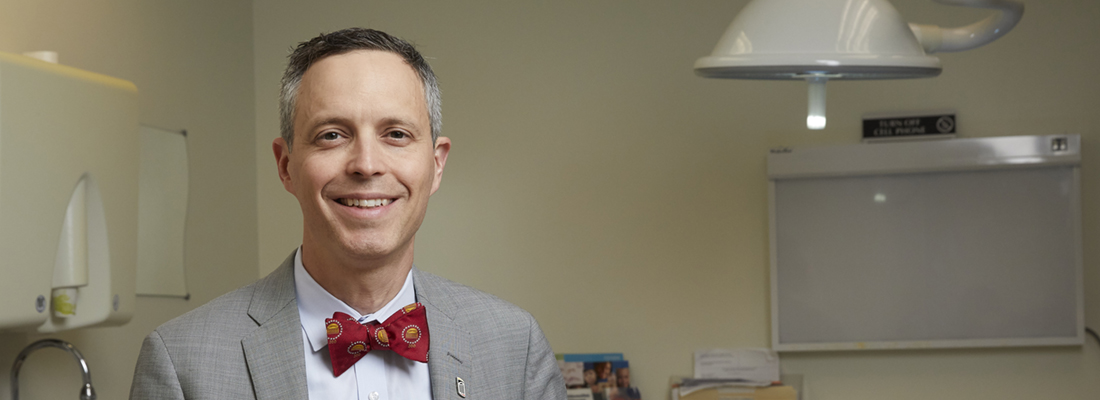
John F. Caccamese Jr., DMD, MD | University of Maryland School of Dentistry
View Full 2017-2018 Champions of Excellence Gallery Find Out More About the Champions of Excellence Campaign
It’s easy to care for children when you’re a parent yourself. Just ask John F. Caccamese Jr., DMD, MD, FACS.
Caccamese is a pediatric maxillofacial surgery professor, vice chair, and medical director of the Department of Oral and Maxillofacial Surgery at the University of Maryland School of Dentistry, and clinical professor of pediatrics and otorhinolaryngology at the University of Maryland School of Medicine. He’s also the proud father of three: Luca, 16; Stella, 13; and Cecilia, 10.
“Dr. Caccamese combines a love of caring for children, a deep respect for patients and colleagues, and a passion for advancing health care through new technologies and surgical approaches,” says Mark A. Reynolds, DDS, PhD, MA, dean of the School of Dentistry.
Perhaps that’s why Baltimore magazine named him a “Top Doctor” in Oral Maxillofacial Surgery in 2016. Most of his job is clinical, so he operates two to three days per week with surgical residents. Other days, he’s doing clinical teaching or conducting groundbreaking research that enhances treatment and advances dental and medical science.
He always envisioned an academic job for himself, one where he would be able to train residents who become leaders in oral and maxillofacial surgery, while also providing exceptional patient care to children and young adults. As an intern, he was inspired by a cleft lip and palate surgery performed by one of his attending surgeons. That day he knew such work would be part of his future. Robert Ord, DDS, MD, chair of the Department of Oral and Maxillofacial Surgery, would give Caccamese the opportunity to join the dental school faculty, and has been a key mentor ever since.
Today, Caccamese treats children and young adults, beginning at birth through their college years, with craniofacial disorders ranging from cleft lip and palate to facial trauma or tumors and other jaw/facial differences.
Often before a baby’s even born Caccamese begins teaching the family about their child’s condition and preparing them for surgery. His job is part surgery, part education, and part emotional support for the family, as he eases their anxiety and empowers them through knowledge.
It’s intimidating to have a child born with a facial difference. Not only are the parents dealing with their child’s visible differences but also they struggle with things like feeding and dental development that other parents take for granted. They’re worried about the surgery, what their baby will look like after the lip and nose are fixed, and how the baby will speak.
“I always tell them their No. 1 job is to get the baby happy and healthy,” he says. Caccamese does the rest.
In 2015, Caccamese received a four-year, $1.29 million National Institutes of Health grant to develop a new system capable of noninvasive, three-dimensional imaging of engineered tissue. He’s working with two researchers from the Fischell Department of Bioengineering at the University of Maryland, College Park on the project.
Regenerative medicine is a life-changing way to repair injury or replace damaged tissues or organs by introducing living cells or functioning tissues. But, Caccamese says, “With conventional reconstruction, you rob Peter to pay Paul, so to speak, so you have to leave the patient with two surgical sites rather than one. This can result in a scar that they don’t like at a donor site or they can have pain from having taken some tissue from one place and putting it into another.”
The goal is to engineer or grow facial bone or soft tissue without having to borrow it. The NIH grant allows the team to look at novel forms of imaging to evaluate the healing specifically in the engineered tissue. Their proposed system could have a tremendous impact on how engineers construct and evaluate 3-D tissue scaffolds, and could pave the way for major advancements in bone tissue engineering. It’s an interdisciplinary collaboration, and Caccamese is proud to contribute his clinical expertise.
When he’s not transforming lives in the operating room or doing groundbreaking research in the lab, Caccamese can be found fly-fishing, running (occasionally an ultra marathon) with his colleague and fitness mentor Marvin Leventer, DDS, assistant professor of the School of Dentistry, serving as the section editor for the Cleft Palate-Craniofacial Journal, or spending quality time with his family. His wife, Suzanne, MD, FACP, is a physician herself at the University of Maryland St. Joseph Medical Center. “If not for her support, I couldn’t do what I do,” he says.
Caccamese believes working with children and families keeps him humble. It’s not a far stretch, he says, that any child he treats could be one of his own. When he’s guiding families to make the best decisions for their child, it’s always in the context of what he’d recommend if his kids were the patients.
“You know what that parent is going through because you’ve been in their shoes in one way or another, whether it’s an ER visit or bad news at the doctor’s office,” he says.
“Empathy comes easy,” he adds. “Having my own children has made me a better children’s doctor.”


